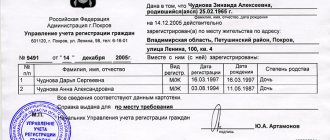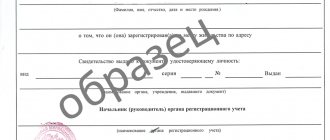Basic provisions
On April 8, 2014, Order No. 293 of the Ministry of Education and Science was approved, which significantly simplified the process of admitting children to kindergartens. Now you can only refuse if there are no places . The presence of secondary factors ceased to play any significant role. When enrolling in a kindergarten, a parent (or legal representative) is required to:
- Personal statement.
- Child's birth certificate (original).
- Identification document of the parent (original).
- Medical report on the child's health.
- A document containing information about the child’s registration at the place of residence or place of stay.
On September 1 of the year of enrollment, the child must be between 3 and 7 years old. Young children
Apart from the listed documents, nothing is required from you.
A parent has the right to submit an application at any time. This can also be done in the form of an electronic document (at the discretion of the organization itself). However, it’s hard to believe that in the outback they will follow all the innovations, but the very fact of such a hypothetical possibility is already encouraging.
If there are no places in the institution, then you should contact the educational authorities. They should help you find a solution to this issue. In fact, this may turn into “tennis” played by officials at various levels, but you should clearly know your rights and insist on the implementation of all legislative acts. Your politeness and tactfulness can be a good addition to defending the rights of your child - causing scandals is definitely not the answer.
An alternative option to simplify the search for a place could be to establish good relations with the head of the kindergarten - it is easier for her to analyze the timing and number of vacated places in her institution, and she, most likely, maintains contact with her colleagues and can advise you of another kindergarten that can there will be vacancies for a child. Trying to use the second option will not take much time and effort, but it can save a lot of it.
Now the law is on your side. There is a vacant place - your child can get into it regardless of their place of registration. Now the main criterion is the position in the queue. Accompanying benefits are the availability of benefits.
How to choose a remote control?
How to determine a kindergarten by registration address? You should start the procedure for enrolling in a kindergarten by registration by choosing the most acceptable option . In many large cities there is a network of various institutions for preschool children of various types:
- General development.
- Compensating – intended for children with disabilities in physical or mental health.
- Health-improving . The main focus of the work of such institutions is the implementation of preventive and health-improving measures.
- Combined . Combining the advantages of general developmental and health-improving remote control. In such institutions there are often compensatory groups.
- Child development centers . Carries out work on physical and intellectual development programs in combination with corrective and recreational activities. Children stay in such institutions part-time.
The entire system of preschool institutions was created with the aim of providing preschool education for children under 7 years of age and solving the problem of parental employment.
The operating hours of most gardens coincide with the working hours of many organizations (from 7 am to 7 pm on weekdays). Preschool educational institutions differ in the number of pupils in each group, as well as their composition. There are groups for children of the same age and those of different ages.
In each district of the city there are
lists of houses attached to certain control centers.
Currently, registration for kindergartens is based on an electronic queue.
Lists of houses can be found on the websites of kindergartens or by contacting them directly, in the Education Departments of each district and on their websites. Parents should familiarize themselves with these lists and choose the remote control that best suits them.
In kindergartens attached to the territory, if there is a registration, the child is included in the “A” list. This means that it should be accepted first as soon as space becomes available.
It is advisable for parents to select several suitable preschools in advance and submit an application for admission to them. As soon as a place becomes available in any of them, the administration will send them a notification, and the child’s admission can be processed.
Find out on our website how to register a child at the place of residence of the father (including a newborn child) or mother, as well as whether it is possible to register a child separately from his parents, for example with his grandmother.
A little about benefits
It should also be remembered that there is priority for preferential categories of citizens. But the list of preferential categories may vary depending on the region of the Russian Federation. In all regions of the Russian Federation, children fall into these categories:
- orphans;
- from large families;
- children of police officers killed in the line of duty;
- single mothers.
To confirm benefits, you must provide supporting documents. The list of required papers to confirm your preferential category must be clarified. Please check for a complete list for your region.
Current legislation provides many degrees of freedom when placing children in kindergartens for all categories of citizens. But it should be remembered that this is impossible to do for a person illegally staying on the territory of the Russian Federation. Problems may also arise if original documents are missing.
If there is no registration
Is registration required for kindergarten? And what to do if it is not there?
The lack of registration in the territory attached to the kindergarten does not mean that only children with a document are accepted into it. If a family lives near a preschool but does not have registration, you can enroll in the kindergarten if there are free places in it .
When organizing admission to a preschool, children from list “A” are first enrolled. In addition to those registered in the given territory, it includes preferential categories .
Beneficiaries include children:
- military personnel;
- police officers, prosecutors, judges;
- fire service and customs workers;
- liquidators of the Chernobyl disaster;
disabled people of groups 1 and 2;- single mothers;
- Children of these categories are admitted to preschool educational institutions out of turn, without regard to registration.
If, after enrolling children from this list, there are still free places, enrollment from list “B” begins.
You can get on this list for enrollment without having a residence permit.
Alternatives
In addition to the methods described above, you can try others:
- Private kindergarten. There are more and more such institutions, but, unfortunately, not every family can afford it.
- Employment in a kindergarten of interest. In such cases, managers, as a rule, are accommodating in terms of placing a child out of turn.
- Bribe. An illegal method, although a fairly working method. I think this is the most extreme measure. If you are asked for a bribe, I recommend contacting the competent authorities.
- Kindergarten at home. Some mothers who are on long-term leave after the birth of a child organize such structures at home. There are much more disadvantages here than advantages. You should not trust your child to non-professionals.
- Nanny. An ambiguous way out of the situation - there are different nannies. If you come to this option, then hire a nanny from an agency - this will give at least a little security in controversial situations.
As a result, we received several options for solving the problem and can safely answer the question: “Is it possible to place a child in kindergarten without registration?” Yes, now it has become a reality. Since 2014, legislation has provided significantly more tools for easier placement of children in preschool educational institutions . You just need to learn how to use them. Your child has the right to preschool education.
Conditions for registration
Registration of temporary registration for a child under 14 years of age includes the following conditions:
- Availability of real estate for registration.
- Registration at the place of residence of the legal representative, because a child under 14 years of age can live and be registered only with his parents/parent or other legal representative.
- If the child is registered in his own apartment, or one of the parents is registered at the place of registration, then consent from the owner is not required.
It is also possible to carry out temporary registration in an apartment without parents, but only for those who have reached the age of 14. In this case, additional conditions will need to be met:
- One of the conditions is the presence of one of the legal representatives during the procedure.
- If the apartment has several owners, it is required to obtain consent from everyone and ensure their presence during the registration procedure itself.
- If the homeowner is unable to be present during registration, it is necessary to obtain a power of attorney for the right to represent his interests to a third party.
It is possible to carry out registration in the apartment of a close relative, the relationship with whom must be confirmed with appropriate documents.
Registration in the living space of an outsider is possible only with the onset of full legal capacity of the teenager.
Where should I go?
The following methods of transferring a set of documents for temporary registration are available to Russians:
- through the territorial division of the Main Directorate of the Ministry of Internal Affairs;
- via Russian Post;
- through the MFC;
- through the State Services portal.
Appeal ruling of the Investigative Committee for administrative cases of the Supreme Court of the Russian Federation
In accordance with the Appeal Determination of the Investigative Committee for Administrative Cases of the Supreme Court of the Russian Federation dated June 15, 2021 N 41-KG 16-20 On sending for a new trial the case challenging certain provisions of the resolution of the administration of the city of Rostov-on-Don dated October 31, 2013 N 1200 “On the approval of Administrative Regulation N AR-096-14-T, a municipal child can attend kindergarten without registration.
In order for a child to attend kindergarten, he must live at the location of the kindergarten. However, residence does not mean registration. Registration or its absence cannot serve as a basis for restriction or a condition for the implementation of the rights and freedoms of citizens. A citizen has the right not to register at the place of residence in the premises if both it and the housing in which he is registered (at the place of residence) are located in the same or another locality of the same region.
In accordance with Art. 19.15.1 of the Code of Administrative Offenses of the Russian Federation, it is possible for a citizen of the Russian Federation to reside at the place of stay or at the place of residence in a residential premises without registration in the case of: residence without registration at the place of stay in a residential premises located in the corresponding locality of a subject of the Russian Federation, if they are registered at the place of residence in another residential premises located in the same or another locality of the same subject of the Russian Federation; residence without registration at the place of residence in a residential premises located in the federal city of Moscow or in one of the populated areas of the Moscow region, if they are registered at the place of residence in a residential premises located in the federal city of Moscow or in one of the populated areas of the Moscow region; residence without registration at the place of stay in a residential premises located in the federal city of St. Petersburg or in one of the populated areas of the Leningrad Region, if they are registered at the place of residence in a residential premises located in the federal city of St. Petersburg or in one of the populated areas points of the Leningrad region; residence without registration at the place of stay in a residential premises located in the federal city of Sevastopol or in one of the populated areas of the Republic of Crimea, if they are registered at the place of residence in a residential premises located in the federal city of Sevastopol or in one of the populated areas of the Republic of Crimea; if they are spouses, children (including adopted children), spouses of children, parents (including adopted), spouses of parents, grandparents or grandchildren of a tenant (owner) of a residential premises who is registered at the place of residence in this residential premises; if the persons living together with the tenant or the owner of the residential premises are in relation to him spouses, children (including adopted children), spouses of children, parents (including adopted ones), spouses of parents, grandparents or grandchildren.
How to obtain a temporary registration for a child for kindergarten?
Temporary registration requires parents to complete the following steps:
- Collection of the necessary set of documents. If you plan to submit an application electronically, you must first register on the government services portal.
- Transfer of a set of documentation for the child and his legal representatives, along with an application for registration, to the regional branch of the Main Directorate of the Ministry of Internal Affairs, to which the powers of the migration service have been transferred. Obtaining a receipt for documents with the end date of the provision of public services.
- Checking the information provided in the application by specialists of the government department for migration control, requesting clarifying information through interdepartmental exchange channels.
- Upon successful processing of the application, a temporary registration certificate will be issued in the child’s name indicating its validity period.










